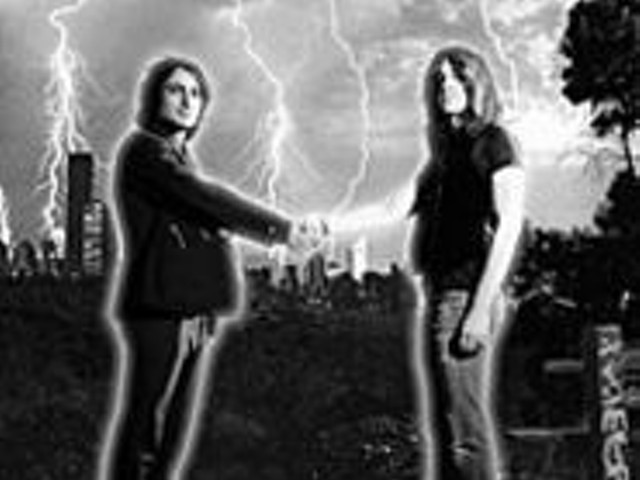Tunde Adebimpe didn't. With an almost childlike disregard for convention, he got himself a four-track recorder and began committing his ideas to tape.
"I don't even know if a cappella is the right word," Adebimpe says. "I guess it's the technical word for it -- people always say barbershop or doo-wop -- but I've never heard a doo-wop or barbershop band where someone is trying to play Fugazi guitar chords with his mouth. That's pretty much what I would do; I'd beat-box drum lines and just kind of hum the guitar lines and then put lyrics over the entire thing, because I just can't play an instrument that well. I can figure out a few chords on some things, but it's just like, I'd just be that guy in the guitar shop who keeps playing 'Stairway to Heaven' and nothing else."
Adebimpe recorded songs in this manner for a couple of years, never sharing the results with anyone. But then Dave Sitek moved into the Williamsburg loft that Adebimpe and Sitek's brother shared. "I just saw that he had tons of musical equipment, and I had all these four-track tapes that I'd just started doing, so we started hanging out and exchanging tapes, listening to each other's stuff," Adebimpe recalls. "We were just bored, dead of winter, and we decided we should start making music together. That was the start of the whole thing."
That thing is TV on the Radio, a band whose unconventional approach to songwriting has earned it widespread praise for having one of the most distinctive sounds in music today.
Both TV on the Radio's debut EP, Young Liars, and its LP, Desperate Youth, Bloodthirsty Babes, have garnered scads of positive press, much of which compares Adebimpe's voice to that of a young Peter Gabriel and likens Sitek's production skills to those of Brian Eno. Despite the overt influences, TV on the Radio has its own sound -- one full of stark soundscapes over which Adebimpe's haunted but melodious voice echoes. The group's sonic architecture is filled with a cappella breakdowns, jagged beats, blurting horns and shoegazer guitars. It's gospel music for the 21st-century church of despair.
And so it's not surprising to find that Adebimpe, like many artists, creates music to provide catharsis: "I know for myself, when I actually sit down to write something complete, it's usually when I'm not feeling that great. It's usually either an effort to get rid of that feeling or to put that feeling into something that is not my head so that I can either play it or look at it and just see it for what it is -- something temporary. You know, kind of just exorcise it that way."
Indeed, Adebimpe and Sitek were exorcising some serious demons when they wrote Young Liars during the months following the World Trade Center attacks. In interviews they have stated that the EP was something of a response to the depression and malaise that followed the events of 9/11, and some of that has even leaked into their newest release.
"I would say that there are some songs on the LP that are naturally about the aftermath of [the attacks]," Adebimpe elaborates. "And I feel like it's a cheap thing to be like, 'Okay, great -- this is my tragedy by proxy,' even though I wasn't really that attached or even knew anyone involved in it. I would hate for anyone to think, 'Wow, this terrible thing happened and now everyone is going to be able to profit off the misery of it.' It's not that at all; it's very, very basic. It occupies a lot of your head space, though."
But Adebimpe doesn't always focus on despondency when he sits down to write. "It's not always a bad feeling," he says, "it can be a great feeling, too, if you just want to capture something and move on and be done with it and leave yourself open to feel new things. I was listening to the LP yesterday, and the general mood of it is very tense and melancholy, and I would say that the very last song is the probably the happiest song on the whole thing."
That song, "Wear You Out," is hardly a stroll on the beach. It opens with a plodding guitar progression and softly tapped hand drums, over which Adebimpe and guitarist Kyp Malone (who joined the band just after the release of Young Liars) simultaneously croon a story about a man seducing a woman in a bar. As the man contemplates how to approach the woman, the song's pace picks up, bringing in droning keys and a whining saxophone. Malone's voice is a fragile counterpoint to the commanding nature of Adebimpe's and, together, the two voices remarkably embody the battle within the man's mind -- play it smooth and talk sweet, or handle it like a caveman, letting male virility take control? He opts for talk, and the dance of flirtation eventually blends into the dance of sex, wearing the lovers out.
TV on the Radio excels in evoking the confusion of everyday life, in capturing the emotional reactions to anything from Janet Jackson's Super Bowl exposure to the trepidation surrounding falling in love to the so-called "war on terror." Adebimpe clarifies: "Everything is getting really surreal. If the world is going to be that sincere with its stupidity, then my only response as someone who makes art is to be as equally sincere with my feelings about how stupid I think something is. Everything is becoming such a weird and surreal collage that all you have to do is document it with a little distance, and you've got something interesting. Every song, both lyrically and musically, is trying to evoke a feeling. No matter how odd things get, if you can make something out of it, then you're probably all right. You can take solace in the fact that other people are just as confused and weirded out."





